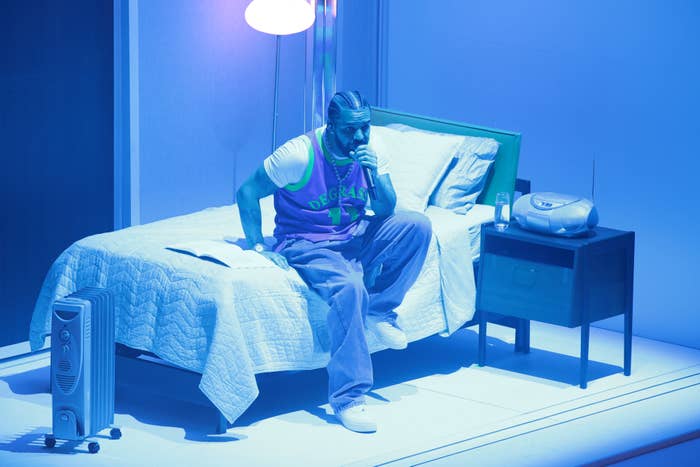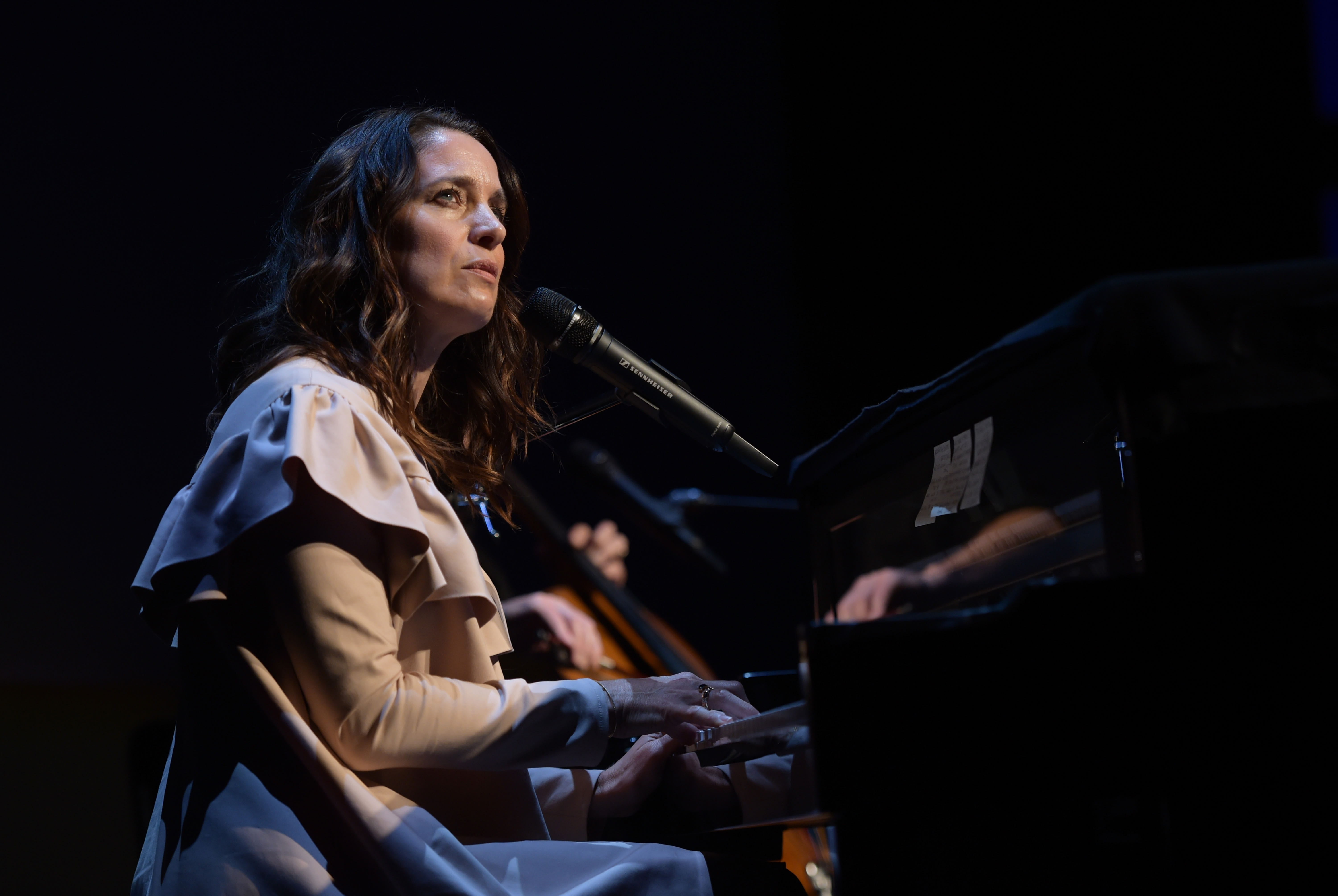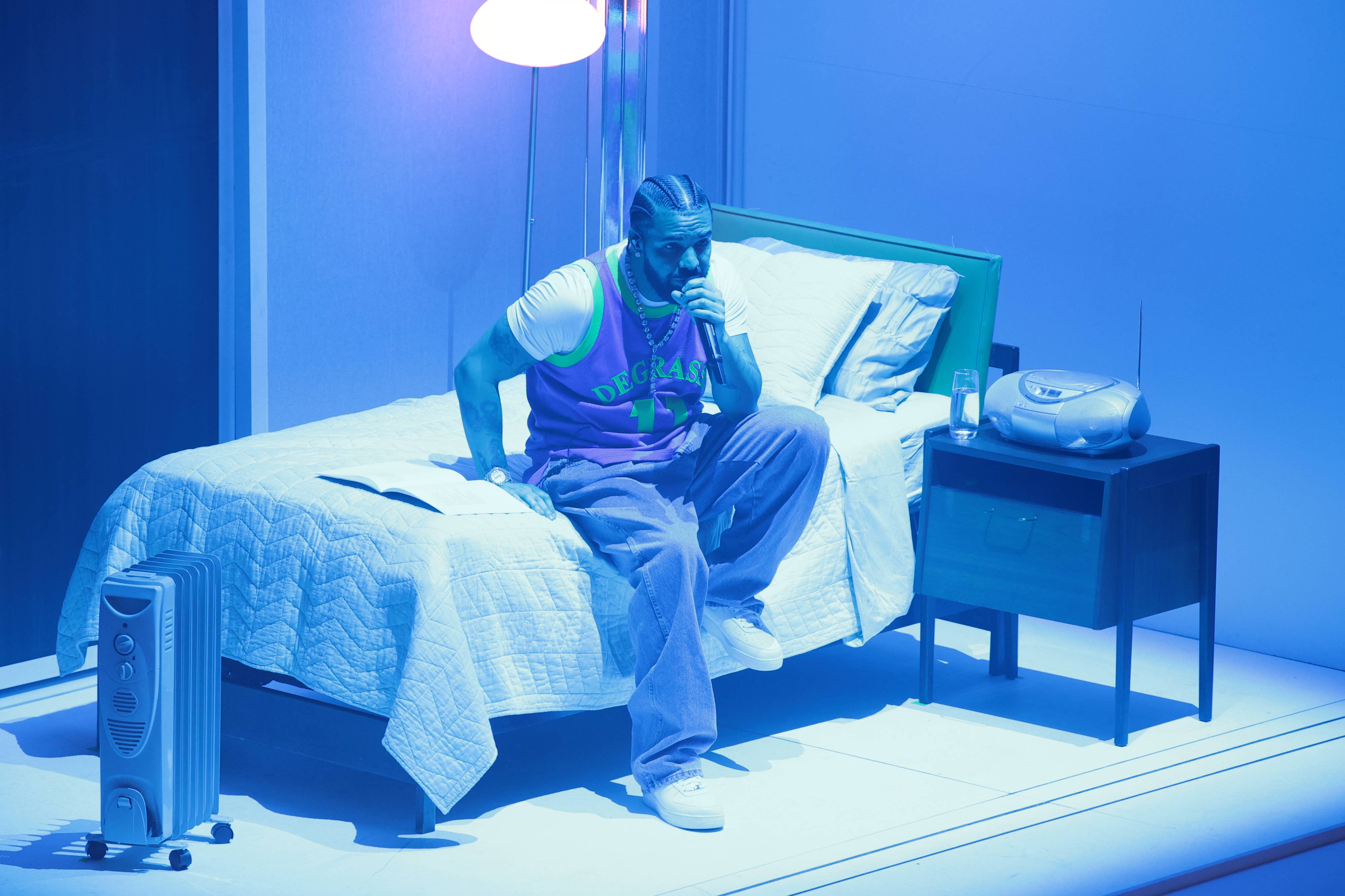
You know the name, and you know her songs. Chantal Kreviazuk’s debut album Under These Rocks and Stones was released in 1996, and featured well-known singles “Surrounded” and “God Made Me.”
The album set off a career that would include multiple platinum and gold albums, with massive singles like “Feels Like Home” and “Leaving on a Jet Plane,” the latter a cover of a John Denver song that appeared on the Armageddon movie soundtrack in 1998.
But one of Kreviazuk’s most iconic appearances is one where she isn’t credited as a feature artist. “Over My Dead Body,” the intro track from Drake’s 6-times platinum 2011 album Take Care, prominently features Kreviazuk’s haunting vocals.
Most recently, Drake performed the song as his opener for his two-night stand at the legendary Apollo Theater in New York City. In the live videos of the show, the crowd can be heard singing Chantal’s portion of the song. For her part, Kreviazuk has shared on her TikTok account that she is the voice behind the song, and looking at the comments on her videos, it’s clear that many didn’t know it was her, including Canadian rap legend Classified who wrote “Amazing. Had no idea that was u.”
Beyond her success in Canada and career-defining covers, Kreviazuk is an accomplished songwriter and producer who has worked with Pitbull and Christina Aguilera on “Feel This Moment” and Gwen Stefani on her Dr. Dre-produced single “Rich Girl.”
Complex Canada sat down with Chantal Kreviazuk to talk about the story behind the creation of “Over My Dead Body,” why she never received a feature on the record, the magic of Drake, her unreleased music with Kendrick Lamar, and why she’s a massive fan of the late Mac Miller.
How did you come to get involved with the ‘Take Care’ album on which “Over My Dead Body” appears?
It was a fluke, to be honest. I am trying to remember why, but I was at a meeting, a dinner meeting, or something at the Thompson Hotel in Toronto. From where I was sitting, I looked at the patio and saw Drake. I think I went and said, “hey.” I remember that he was just such a charismatic person. And we ended up having a nice chat. And I said to him, and it’s funny because I don’t even know why I would say this, But I asked are you working because it was just about 10, 12 years ago, and I loved working on everything years ago. I loved the opportunities to be creative every day. And so I said, Hey, we should collaborate. Or maybe he said it to me; I can’t remember. But I remember saying, Well, I’m in town tonight. I think he called 40 right then or texted him in front of me. He said to go over to the studio. I’ll be right there. This is my memory of it. I remember it being super organic and spur-of-the-moment. And there was this neat respect, probably because I had about 15 singles out at that point in Canada. I’m sure he knew me, and I obviously knew he was this amazing person that just bloomed onto the scene.

I went to the studio, and “Over My Dead Body” was born. I knew at the time that it was really special. I recall that it was the first song recorded for Take Care. And I think it was right away, “this is the intro.” It was one of my favourite things I’ve ever written or recorded. I love playing the piano and singing it so, so much. Then I got obsessed with it, and I would call 40 and say, I want to come and do more vocals on it and work on something else. I became really passionate about the project and those guys. The scene was very creative.
Were you in the studio with both Noah “40” Shebib and Drake for the sessions?
Yes. Drake was very sweet. I was very nervous because it was a bit more musical when I first recorded the song. Sometimes when I go in with an artist, I know exactly what I want to say because of the type of artist they are. And I can throw words and lyrics and stories. But this was Drake. He tells his own story, you know. And the whole not getting the feature thing, how was I going to put my story on him? I remember this one time he sat with me and said, you’ve already said all the words; let’s transcribe them. The words were there, but they were a little bit more gibberish, but one thing that I was always saying was (singing where the word body runs on) “only, over my dead body.” And I’m like, what are we going to do about that? It doesn’t end. It doesn’t say “body.” And Drake was like, ‘What? Are you kidding me? That’s great. Just do that. Leave that shit.’ And that was very cool. I often use that feeling of, well, your body’s already saying the words, and you don’t have to think so much and transcribe what this sort of enunciation gibberish is, and perhaps the story is in there.
What was Drake’s reaction to the song’s final version?
Everyone loved it. I remember 40 would send me a mix. The way they mixed my voice in it was a little mysterious and set back in the mix. I was just happy to be there. I wasn’t going to complain or anything. I have a production credit on the song. And they asked me if there was anything I wanted to say about it, and I said can you lift my vocal up a bit in the mix, they did, and that was pretty cool.
There was magic to the vocal. It sounded otherworldly. And if they were to say, ‘oh, it’s that person,’ maybe it would take away from the magic. I believe that he really thought that it sounded like a sample.
What do the lyrics mean in your portion of the song? Specifically, “how I’m feeling, it doesn’t matter/because you know I’m okay.”
People connect with the song so much because of the feeling of when something is too good to be true. And just being a little jaded. There is an angsty teenager in all of us. It never goes away once it comes in. It’s maybe just calling bullshit like how I’m feeling; it doesn’t matter. I’m fine. I got it. We all feel a little sorry for ourselves and feel misunderstood. We all have regrets, and all have remorse. We all have things that humanize us. It also teeters on paranoia. I know you don’t love me. They’re trying to take you away from me, but then coming back and saying, you know what, over my dead body. The song holds out for love and life and the positive. And as an artist, that’s what my music always is. There’s a lot of lethargy in my music. There’s a lot of lilt in my music. It’s a lilting daisy, but it’s still a daisy. That’s what the song embodies. Drake says, ‘I think I killed everybody in the game this year.’ That’s the trick of Drake. He somehow manages to take these beautiful things and, with all of his masculinity, can sit up against it and be comfy. That’s the magic. Not a lot of people can do that.
Why weren’t you credited as a featured artist on the song?
Look, it wasn’t a Chantal Kreviazuk album. It was an Aubrey Graham album. I was told I wasn’t getting the feature the night before it dropped. A few people surrounding the record are people that I adore. I think it was Chris Taylor, who’s family. Derek Gilmore, who used to manage me under Sam Feldman, who’s family. I’m not mad at anyone. I’m grateful to be on the project. At the time, I did ask Drake why I didn’t get the feature. We’d become friends during the making of Take Care. He did discuss it with me, and it was more about the mosaic he was putting together. There was magic to the vocal. It sounded otherworldly. And if they were to say, ‘oh, it’s that person,’ maybe it would take away from the magic.
I believe that he really thought that it sounded like a sample. I was given a choice at that moment the night before the album came out. Do you want to open this can of worms? Creatively they had given me an amazing opportunity, and I loved the whole process. I didn’t think it was a big deal, and I let it go. It wasn’t my project to make that final decision. The song lives on. I got to watch it when I posted it on TikTok. I thought people knew I was the girl on that song. My kids’ friends freak out that I’m the lady who did “Over My Dead Body.” It’s hilarious.
Has there ever been talk of you and Drake collaborating again?
We did on his Scorpion album.
You were on ‘Scorpion’?
We collaborated on some things that didn’t make the project. I liked them, and I thought they were cool. There was a song of mine that Drake loved, so I held my album, and I was waiting and waiting to see if he would use it. It took a while for him to tell me he wouldn’t use it. That’s a song called “Love Gone Insane.”
Drake recently opened his Apollo shows with “Over My Dead Body.” In the live videos from the show, the crowd can be heard singing the chorus you sing. How did that make you feel?
You can never get over how it feels to hear people using your song, singing your song, and that never gets old. It blew up again, getting hundreds of thousands of views on various platforms.
A while ago on TikTok, you released a video with some of the second verse of “Over My Dead Body” and told fans you would release your version of it. Why have you yet to do that?
I do have a recording of it right now. Maybe I’ll do a little project of covers of my songs. My DMs are hilarious. People write me like, “you don’t understand – please release it. Just you and the piano.” Rod Wave just did a cover of it called “OMDB.” It shows the song resonates across generations. The song is now evergreen with a life of its own.
I watched an interview where you mentioned working on Kendrick Lamar’s ‘To Pimp A Butterfly’ album. What did you do on that record?
I wrote a song called “Happy For You.” It looked like that was making the album. There were a couple of others. I was in that studio a lot with Thundercat. In the end, it was weird. Suddenly they were like, ‘we’re using “Pay For It.”’ We’re not using “Happy For You.” And “Happy For You” became a massive song about Trayvon Martin. It was intense. It was heavy. I was sure that was going to make the album. But then they called and said they were using “Pay For It,” which would be Jay Rock’s song featuring Kendrick Lamar and me.
Are there any other hip-hop connections we should know about?
There’s some weird stuff. Pusha T used something of mine, and that freaks me out. It was one of those things where they asked later because it was already out.
Hip-Hop will love that you’re so present in Drake’s career, and Pusha T also used one of your songs.
It’s weird for me because there is a bad relationship there. I didn’t like personally some of the things that were said publicly in that beef, and it’s not nice to be mean publicly to anyone.
Why do you think you’re so intertwined in hip-hop?
The Drake song is the first thing that happened, and it opened the door. Maybe my voice and my music offer some healing. With R&B and hip-hop, there is this creativity that has a healing vibe in the rhythms and the sound design.
That’s the trick of Drake. He somehow manages to take these beautiful things and, with all of his masculinity, can sit up against it and be comfy. That’s the magic. Not a lot of people can do that.
Do you listen to hip-hop regularly?
Yeah. I have three teenage boys, so I get every new drop. And I’m like, what is this crap? Or like, oh, this is good. I’m a big fan of Mac Miller, Chance the Rapper.
Why Mac Miller?
His music is really good, and there is no question. Many people are like, ‘music is crap these days,’ and I disagree. There is still a lot of great music.
How do you feel about the state of the music business today?
Back in the day, 15 or 20 people were at the top of the charts. You got a record deal. Maybe they shelved you. Perhaps they didn’t. There was a system. Now the systems are evolving and changing, and that’s tough. It can be challenging for younger artists. I’m glad I came upon my career when I did where I planted the seeds, and then it’s just like a harvest. I’ve got these gold songs, and I can sing them when I want.




